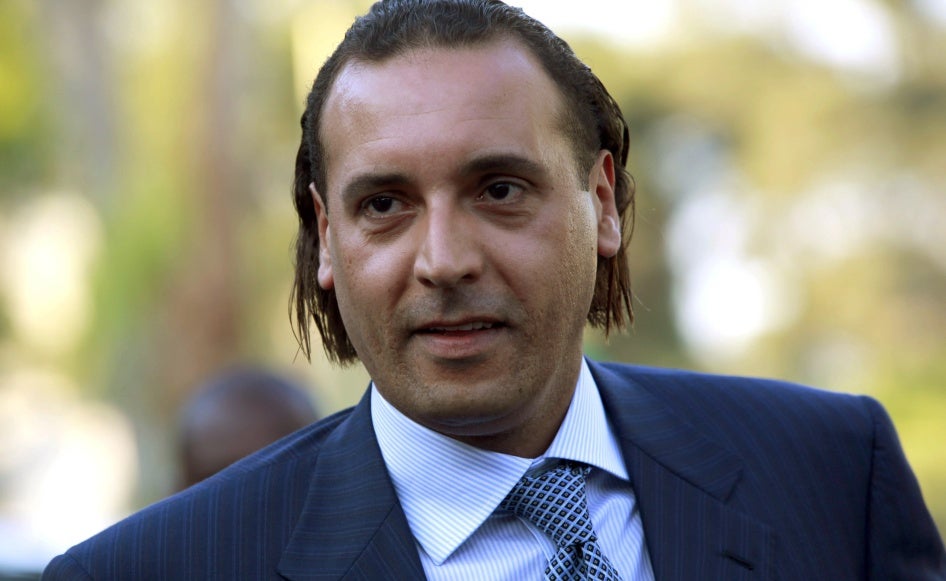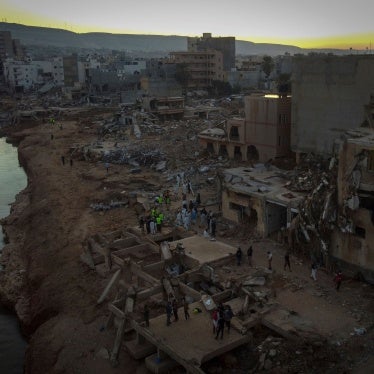(Beirut) – Lebanese authorities should immediately release Hannibal Gaddafi, a son of Libya’s former leader, who has been held in pretrial detention on spurious charges since his arrest in December 2015, Human Rights Watch said today. Nearly 80 percent of Lebanon’s prison population is in pretrial detention, some held for many years and without charge.
Lebanon’s Internal Security Forces, which oversee prison operations, took custody of Gaddafi in December 2015, alleging that he had a connection to the disappearance of a Lebanese Shiite Imam, Moussa al-Sadr, and two of his companions in Libya after an official visit in August 1978. Even though Gaddafi was only two years old in 1978 and held no senior official position as an adult, Lebanese authorities charged him with “withholding information and subsequently interfering in the crime of continued kidnapping” of Imam Sadr, said one of his lawyers.
"Hannibal Gaddafi’s apparent arbitrary detention on spurious charges after spending eight years in pretrial detention makes a mockery of Lebanon’s already strained judicial system,” said Hanan Salah, associate Middle East and North Africa director at Human Rights Watch. “Lebanese authorities have long since exhausted any justification for continuing to detain him and should drop charges and release him.”
Human Rights Watch wrote in July 2023 separately to the Lebanese Internal Security Forces director-general, Major General Imad Othman, and to Judge Zaher Hamadeh, the judicial investigator in charge of the case, requesting detailed information on Gaddafi’s judicial status and health, but has not received a response.
The lawyer told Human Rights Watch that Gaddafi went on a hunger strike from June to October 2023 to protest his continued arbitrary detention as well as detention conditions that resulted in him losing considerable weight and repeated hospitalization. Prison conditions in Lebanon have dangerously deteriorated since the country’s slide into a serious economic crisis in 2019. Conditions include inadequate health services, insufficient and poor quality food, and severe overcrowding that authorities blame on an increase in crime rates, slow trial proceedings, and the inability of many who have served their sentences to pay fees required for their release.
Unidentified armed men kidnapped Gaddafi in 2015 in Syria near the Lebanon border after he was reportedly misled to believe that he would be interviewed by a newspaper. Instead, the men transferred him to Lebanon, where they tortured him, demanded information on Imam Sadr’s disappearance, and demanded a ransom, the lawyer said. Gaddafi had been living in Syria with his family after fleeing Libya at the onset of the 2011 revolution that toppled his father’s regime and after some time living in Algeria and Oman.
Lebanese authorities freed Gaddafi from his captors but reportedly arrested him within days and kept him detained at the Internal Security Forces Information Branch after Judge Hamadeh issued an arrest warrant accusing him of concealing information about the disappearance of Imam Sadr. Gaddafi was formally charged 2016, apparently based on reports that he knew where Sadr had been held between 1978 and 1982. Gaddafi and his lawyer have denied this allegation.
In December 2015, Lebanese authorities detained a former Hezbollah member of the Lebanese parliament, Hassan Yaacoub, for his alleged role in Gaddafi’s kidnapping. He is a son of Sheikh Mohammad Yaacoub, a Sadr aid who disappeared with him in Libya. The authorities released Yaacoub without charge in July 2016.
In 2018, a court handed Gaddafi a 15-month prison sentence in a separate case for “insulting” the Lebanese judiciary as well as a one-year travel ban.
The disappearance of Sadr, the Iranian-born cleric and popular founder of the Lebanese Shiite political party and armed group Amal, caused a rupture in relations between Lebanon and Libya. Muammar Gaddafi during his lifetime maintained that Sadr and his two travelling companions, Yaacoub and a journalist, Abbas Badreddine, left Tripoli in 1978 on a flight to Rome, but Italian authorities denied the claim and Sadr’s followers accused Gaddafi of disappearing and subsequently killing all three over disagreements on payments to militias in Lebanon.
Lebanese authorities have claimed that Hannibal Gaddafi provided an affidavit during his detention with information on Sadr and his aides’ alleged detention in Libya after their disappearance, but a lawyer for Gaddafi in 2022 dismissed these claims, stating that Gaddafi had been forced to sign a document under duress, without the presence of a lawyer.
Throughout Gaddafi’s imprisonment, Lebanese authorities have released little information on his judicial status and the legal basis for his ongoing detention. It remains unclear which judicial entity periodically signs off on his continued detention, and how often Gaddafi is taken before a judge.
In January 2019, then-Lebanese Justice Minister Selim Jreissati asked the head of the Judicial Inspectorate, the state body in charge of supervising the judiciary and the work of the judges, to assess whether Gaddafi’s continued detention without trial remained judicially relevant, but the results were not made public. Libyan authorities in August 2023 also questioned the legality of Gaddafi’s detention and said that Lebanese authorities should release him and allow him to return to Syria to his family, but Lebanese authorities did not respond.
Under international law, detention is subject to strict due process, in particular informing the person of the reasons for arrest; basing detention on clear domestic law; promptly taking the person before a judge and charging or releasing them; providing a judicial ruling on the legality of detention; the right to a speedy trial or release from detention; and providing regular opportunities to challenge the lawfulness of a long-term detention. Failure to respect such procedural safeguards makes a detention arbitrary. Under international law, pretrial detention should be the exception, not the rule.
Article 9 of the Universal Declaration of Human Rights states: “No one shall be subjected to arbitrary arrest, detention or exile.” Article 9 of the International Covenant on Civil and Political Rights (ICCPR), which Lebanon ratified in 1972, specifies that “[n]o one shall be deprived of his liberty except on such grounds and in accordance with such procedure as are established by law.”
“It’s understandable that people want to know what happened to the Imam Sadr,” Salah said. “But it is unlawful to hold someone in pretrial detention for many years merely for their possible association with the person responsible for wrongdoing.”








